Published Dec 15, 2021
Alex White is Ready to Bring You Back to Deep Space Nine
The author shares the secrets of their new book, Revenant
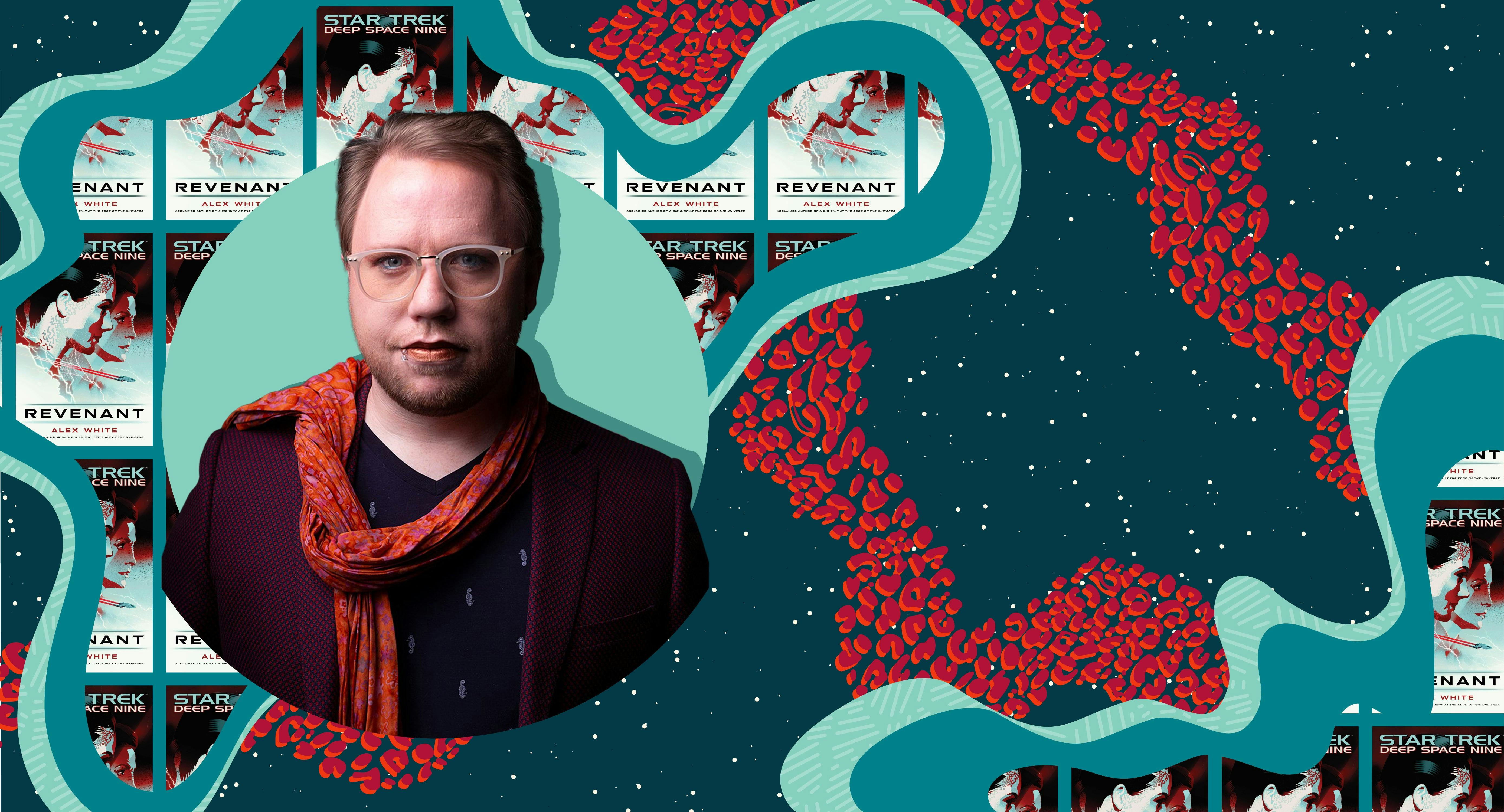
StarTrek.com | Kyle Cassidy/Wikimedia Commons
Minor spoilers for the upcoming novel Star Trek: Deep Space Nine: Revenant to follow!
Jadzia Dax becomes embroiled in a mystery in Revenant, the latest Deep Space Nine novel written by first-time Trek writer Alex White. White is best known for their work both in original fiction with Every Mountain Made Low and The Scavengers series, and for writing tie-in novels for the Alien franchise. White sat down with StarTrek.com for an in-depth interview about Jadzia, Trill culture, and writing for the Star Trek Universe.
StarTrek.com: What was your First Contact with Star Trek?
Alex White: I used to watch The Next Generation when it came on, but not religiously. I got really, really into Star Trek because one of the networks was playing a The Original Series marathon. My sister and I started out like, "Ha ha, look at these silly old shows," and we found quickly that it was not only hard to make fun of them, [but that] they were awesome and we were so wrong. That's when I got completely hooked, and that was when I also realized the difference between high-budget special effects and good storytelling. That was around the same time the Deep Space Nine was coming out and Star Trek also had their 25th anniversary convention in Huntsville, Alabama at that point as well. So it all coincided in a really exciting way to get me like way into it.
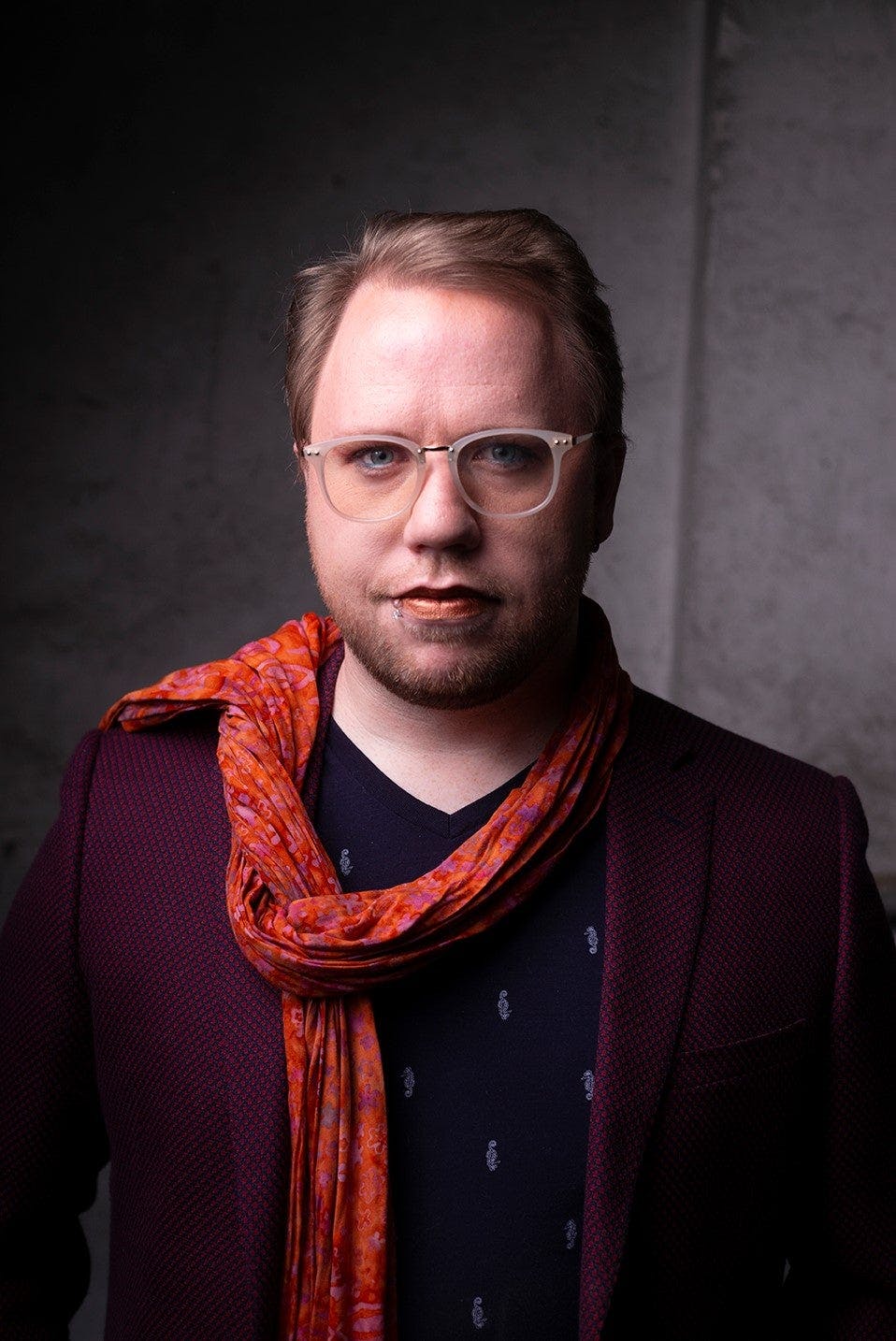
Kyle Cassidy, Wikimedia Commons
What is the process like for bringing a Star Trek novel to life?
AW: I was funny because I'd often told my agent like, "I don't think I could write for Star Trek, there's just so much to know and so much canon." When he called and was like, "Yeah, they want you to write for Star Trek," I was like, "I don't know about this because I really only know about Dax in Deep Space Nine and I don't think they're still making those books." And he said, "Good news, they're totally making those books and that's exactly what they want you to write."
From there, it was like, if I'm going to do a Dax book, first of all, we wanted to go watch a list of all the greatest hits of Dax. I really loved seeing her evolve, Jadzia was my first Dax. When you have a character who's Trill, you can't resist doing a multi-life storyline and I think that's something that I would've enjoyed seeing a lot more exploration done on in the series. Unfortunately, I think they killed off a character that a lot of us really appreciated, but I love that kind of stuff. I love Dax going on trial for murder from a previous life and things like that. I always thought those were really cool questions to ask.
What does it mean to you personally to be able to write a Star Trek story?
AW: It's intensely validating because I've used Star Trek as a very high mark of quality in science fiction. It's an acknowledged great thing. We love it. We can't get enough of it and to be able to pick that up even for a little while and write something and have people say, "I really liked this, it really worked for me," it's like being able to say, "Oh, I played major league." So for me it means that I'm welcome in the realm of science fiction, and that it's not weird that I wrote Star Trek. That it's just now history.
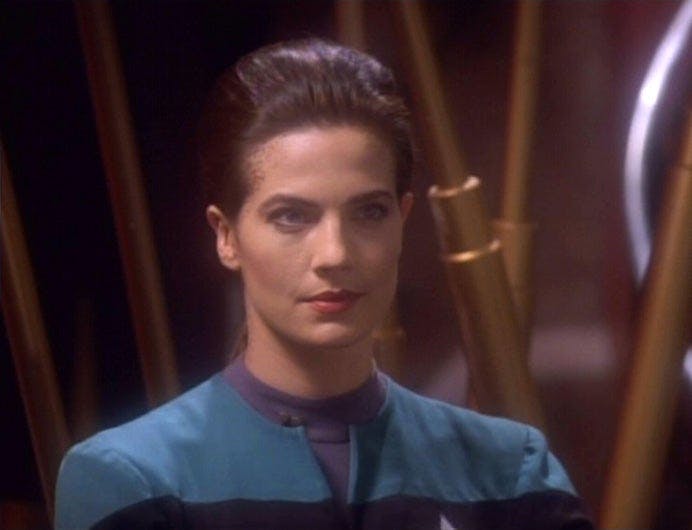
StarTrek.com
Jadzia is such a beloved character in the Trek canon. What were the joys and the challenges of bringing her to life on the page?
AW: One of the things I like about her is that she's a really positive character, but she's not a pushover in any way. She's so smart that you have to work harder as a writer to be as smart as she is, which is great because I have unlimited time to come up with one-liners, right? I can sit there and stare for a long time, but it's difficult because a lot of characters rely on cynicism or betrayal or sort of these darker, more negative emotions to generate their interests. Jadzia is an interesting character because she's so unequivocally good and friendly and cool and helpful, but she's still not perfect. Trying to balance that is tough because she's really not like other characters. She's the kind of person I think a lot of us would really like to know.
We get to see Kira as well beyond the worlds of the station and Bajor in this novel. Was it fun to craft a new Kira story that felt fresh and unique on her journey?
AW: Yes. One of the things that I like about Kira is that she is a resistance fighter. When I was just getting out of high school, I worked at this place where there was a woman who had fought in a revolution. I didn't know that at the time, but she was this very cool, awesome, professional woman that I really looked up to and then one day it came up that she'd been in a revolution. And I completely recontextualized her. I feel like there's a lot of that same energy with Kira for me where everybody thinks of her as, “Oh, you're station operations, you keep the trains running, and all this other stuff.” And it's like, yeah, there's a lot though that's going on. She's been through some things, man. So it's funny because her attitude, I think, towards the world is a lot more… the rules are more malleable for her than for other characters. I really appreciate having her around for when those rules need to be broken a little bit.
Out of the rest of the Deep Space Nine cast who appear in the novel, was there any particular one that you had the most fun writing or was there one whose voice was particularly challenging to capture?
AW: It was nice to bring in Dr. Renhol, who was Jadzia's doctor in “Equilibrium.” That character had a lot going on when you think about it from a backstory perspective, because it's somebody who is having to weigh her professional and medical obligation towards somebody that she cares about against the secrecy and national security of her people and in the book it sort of comes up again. That sort of violation of trust, isn't something that just goes away. So it's really nice to be able to both revisit that and try to recapture that character who is both concerning and caring and not necessarily trustworthy. I also really loved writing Joran and Curzon.
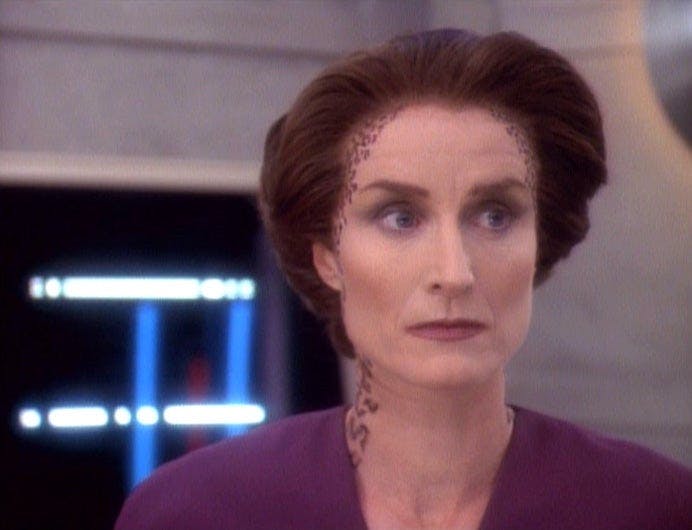
StarTrek.com
A large part of the novel is set on Trill, which is a planet that within the Star Trek shows that we've only actually visited a couple of times. What was it like getting to create a whole new part of Trill culture and expand the worldbuilding of that planet?
AW: It was really exciting because there's a blank space there. There isn't very much that's been developed and we've seen some images of it, and there's very clearly an extensive culture. What's great about everything that we've seen about the Trill is that they just beg for stories to be told, right? You can't start talking about how a joined Trill goes through their day without stumbling upon some wonderful fictional possibility. It was so easy to see it and over the course of writing the book, I was like man, [I have] like five or six books I had I could write about the Trill pretty easily. And so the world building is really exciting because you're working in that space, but at the same time, because that space is an active development, you want to be really careful and you don't want to do something that steps on their toes.
Something that I found deeply moving about this novel, and that I also found fascinating, was that there was this study of death in Trill culture and that's made all the more poignant knowing what happens to Jadzia in Deep Space Nine. What shaped that particular story or the decision to tell this particular story?
AW: Mourning is a part of death. I think as fans, we all are still sort of mourning Jadzia a little bit. So, there's a lot of the book that's written from the perspective of somebody who knows what's coming, who is sad about it maybe, who wants to remember a part of the show where she's not dead. What's great is it's fiction. You can remember any part of it you want. She's not actually dead. Then to sort of pair that with the fact that we're in a very lethal time and a lot of us are dealing with pain and loss. I know I am from these past two years.
It's nice to explore those things through fiction. And you do have to ask yourselves sort of what deaths transcend life. If somebody does something truly abominable a generation or two ahead of you, it still impacts you. I think we as a society often need to ask ourselves what debts do we owe that were maybe incurred by our ancestors? So this book sort of is like, "Hey, you don't have to love what happened, but you might have to take responsibility." And that sucks. We can be mad about that. We can be mad at people who put us in this bad position, but we still have to do something about it.
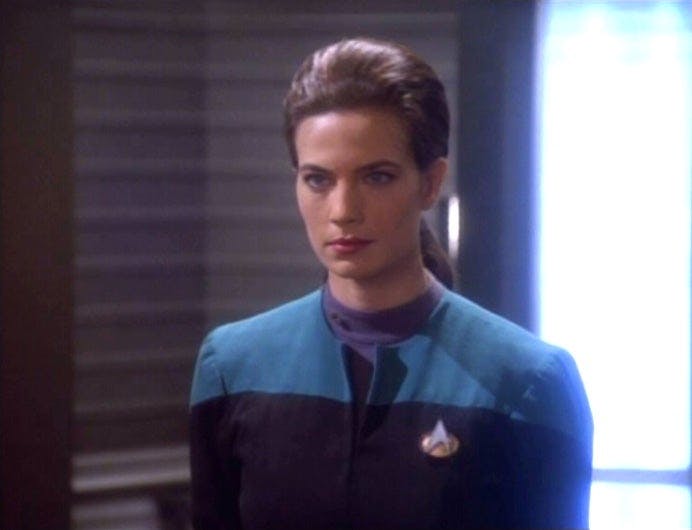
StarTrek.com
Going back to the writing process for this novel, what are the particular challenges of writing a Star Trek novel when it comes to balancing a new adventure for these characters, but also fitting into the original canon?
AW: Oh my gosh. So the biggest problem is of course that we know where Jadzia is going to end up. We know not only where she's going to end up physically, we know where she's going to end up emotionally — who is she going to fall in love with. Which, by the way, that's one of the greatest stories, the Jadzia-Worf love story. I set [Revenant] at the beginning of that, right before that, because I love that tension. Anybody who wants that tension should read that book.
But the challenge of writing for someone where their destiny is, so far ordained is… what are they going to have some life changing adventure over the weekend and then never speak of it again on the show? So I tried to pick something where, if you settled it, it would be something so personal that maybe you wouldn't? Also at the same time, I was really disappointed in how they handled Joran. Disappointed might not be the right term, but I don't ever like someone who kills people because they're crazy. I actually find that to be quite ableist. People with mental illness are more likely to be the victims of violence than the perpetrators. There's a reason why in Alien: The Cold Forge, they don't say this character's a psychopath because he is not, he's just bad.
So Joran, I was kind of like you don't just wake up and kill people and explain that away as, oh, he's psychotic, is not okay. So that was where I was like, okay, if we start doing things that recontextualizes the most private, most difficult parts of Jadzia's past, then maybe she wouldn't talk about it anymore for the rest of the series. Maybe it does fit really nicely in this sort of side adventure. And it was also really great to make references to the budding relationship between her and Worf as well as the secrets that Julian has about being genetically enhanced are all sprinkled through the book. If you look for them, he certainly is good at throwing things. So setting it in that period enables me to best experiment with those characters in a way that helps them feel like they grew, but still puts them back on track.
Did you sprinkle any Easter eggs in the text for eagle-eyed fans to find?
AW: Oh, absolutely. Always, always, always. There's lots of good little secret jokes in there, little things about what it would be like if you actually lived in that future. Would it be as convenient as it seems? It's interesting that Lower Decks is canon, because it opens up a lot of really weird questions like how small is a warp core before you don't vaporize everybody in the room when you blow up the shielding on her? How many murderous, super intelligent AIs are there? So there are some things that probably would've even made it into the novel from Lower Decks this season. I've been inspired by it a couple of times before.
So yes, I love Easter eggs. I love throwing in Easter eggs. People who read the Aliens novels will know. I try to put them in as many times as I possibly can, but you don't have to watch the show. That's something I would want to drive home. If you're new to Star Trek, it's okay, I think you'll still enjoy this book. You can look stuff up on StarTrek.com. I want a book that's accessible. I want people to feel like they can come back to something that they don't remember that well. If you haven't watched Deep Space Nine in a while, that's okay.

StarTrek.com
If you had the opportunity to write more Star Trek novels, do you have any other stories in mind set in this universe, or is there a particular character who you'd really love to write?
AW: See that's the problem with Star Trek; everything is really neat. Absolutely, I would love to write more Trill stories because they're so interesting and the implications in them are so interesting, but I've always enjoyed all the different cultural perspectives in Star Trek. And I think that you can really just point to any of the myriad colorful worlds that have been created and say “what happens there” and you can find a novel pretty quickly. So, my two cents is it would be pretty easy to write some more Star Trek books.
This interview has been edited and condensed. Star Trek: Deep Space Nine: Revenant goes on sale Tuesday, December 22.
Julian Gardner (they/them) works on the editorial team for StarTrek.com.

